Are you a Quiet Speculation member?
If not, now is a perfect time to join up! Our powerful tools, breaking-news analysis, and exclusive Discord channel will make sure you stay up to date and ahead of the curve.
Delver of Secrets catches a lot of flak in Modern. I'm no stranger to being teased for my deck choice, so when I was preparing for the Indianapolis Open the stigma of potentially scrubbing out with a fringe deck didn't bother me too much. Throughout the various eras of Modern, it's hard to say which of my decks was the most embarrassing. Back in 2012 I played a deck featuring Sedraxis Specter in Grand Prix Lincoln. Nobody brings up the fact that I was the only one of my friends to cash that event, but everybody remembers that I registered a card barely fit for Block Constructed. A little later down the road Delver become somewhat popular in Modern in conjunction with Deathrite Shaman. I played variations of that deck until Shaman was banned, after which I continued to tinker with Delver strategies. Those familiar with Modern history know there was never a window where Delver was actually good between the Shaman banning and the printing of Treasure Cruise. Even still, I've never been convinced that Delver decks didn't have merit.
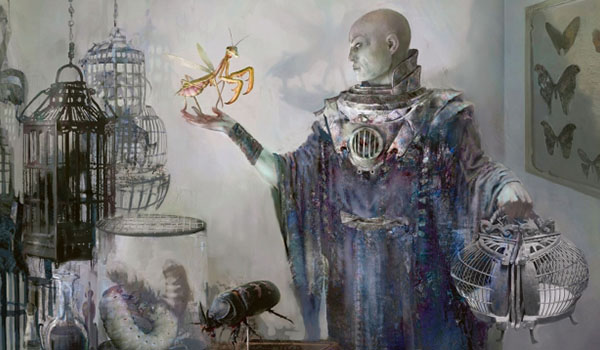
I was playing Delver even when Lingering Souls was prevalent in Modern, a nigh-unbeatable card for Delver strategies. Abrupt Decay wasn’t pleasant from the other side either. During this era I was making the Top 8 of PTQs, even if Lingering Souls kept the blue envelope out of my hands. Then Treasure Cruise rolled around and the deck was just busted. When that was banned, Grixis Delver with Tasigur, the Golden Fang started seeing fringe play. The archetype became very powerful with the printing of Kolaghan's Command, and suddenly playing a Delver mirror was a realistic expectation for a given Modern tournament again. It was in this window, almost one year ago, that I posted a 7-1 record in the Modern portion of an SCG Invitational with this list:
[wp_ad_camp_1]
Grixis Delver, by Ryan Overturf (56th, SCG Columbus Invitational, 6/5/2015)
Delver is so frequently discounted in Modern partly because players approach the deck trying to capitalize on the potential speed of early Delvers. Building the deck heavily around Delver means including a lot of situational cards like Vapor Snag, and biasing towards Remand over Mana Leak. 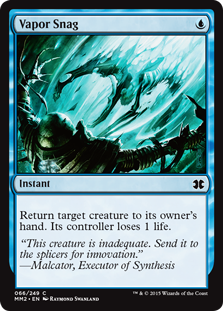 This results in an extremely high-variance build. You either get ahead and are great at staying ahead, or you fall behind and stay there.
This results in an extremely high-variance build. You either get ahead and are great at staying ahead, or you fall behind and stay there.
What my build does is focus more closely on the power level of Snapcaster Mage, and as such is biased towards hard answers to opposing threats. Just having Delver in your deck gives you the potential to run away with games, but playing spells that cater to Delver ends up pigeonholing you into a deck that can only win short games, whereas building the deck with hard answers enables you to compete in longer games. When you're threatless and casting Vapor Snags and Remands, eventually that Tarmogoyf is going to get you. Spell Snare and Terminate enable you to just kill the Goyf dead and move on.
This leads to the question of why to play Delver at all---the answer is that Grixis Control struggles against decks that are fast and resilient, the most prime examples being Tron and Valakut decks. Putting Delver in your deck ends up making you generally weaker in blue mirrors, though stronger almost everywhere else. The Spell Snares help you fight Snapcaster wars and the low land count can go a long way in these blue mirrors, though that matchup is one you can't ignore in your sideboard playing Delver---particularly now in the age of Nahiri and Ancestral Vision.
There have been some significant changes over the course of the last year in Modern, though my deck has remained largely the same. With Birthing Pod banned there's no reason to sideboard Hibernation (same story with Combust versus Splinter Twin) but most of my changes have to do with lessons I learned about the deck itself and the introduction of Ancestral Vision to the format.
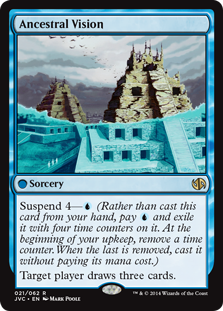 I had a Flooded Strand as another means to find basic Island, which wasn't very important, and a Darkslick Shores to try to save on life which was less important than doubling up on the fetchable Watery Grave in a Thought Scour- and fetch-heavy deck. The sideboard Deprive was basically always terrible. Electrolyze is too inefficient now and the matchups where it really shines aren't especially popular. In particular it was great in Delver mirrors, helped compete with Lingering Souls, and was far more important against Birthing Pod than it is against Collected Company.
I had a Flooded Strand as another means to find basic Island, which wasn't very important, and a Darkslick Shores to try to save on life which was less important than doubling up on the fetchable Watery Grave in a Thought Scour- and fetch-heavy deck. The sideboard Deprive was basically always terrible. Electrolyze is too inefficient now and the matchups where it really shines aren't especially popular. In particular it was great in Delver mirrors, helped compete with Lingering Souls, and was far more important against Birthing Pod than it is against Collected Company.
Between that showing and Indianapolis I've done very well with the deck in local events, though to wit I don't believe I played in any other large Modern events in that window. I finished in second place of a local 84-person tournament about a month before Indy with essentially the same list that I ended up bringing to the Open, and despite the sideboard Ancestral Vision feeling rather hamfisted, it's the best thing that I've come up with to date. Here's the list I took to a Top 8 finish in Indy:
Grixis Delver, by Ryan Overturf (5th, SCG Indianapolis, 5/14/2016)
The maindeck Pillar of Flame was a concession to Voice of Resurgence and Kitchen Finks that could also just go upstairs when it was bad. Previously this was the second K Command, though that card is rather inefficient in the format at large right now---as such the first copy matters a lot more than the second. You want to have the Thought Scour-Snapcaster-K Command engine, but there is a real risk of getting run over if you draw both Commands against a lot of decks. For this tournament the Pillar would have been significantly better as a Dismember given my pairings and ultimate loss to Phyrexian Crusader in the Top 8, but that is something of an after-the-fact observation. The majority of the deck is solidly locked, though that specific slot I'd recommend playing around with and adapting to your expected metagame.
Now that I've bored you to tears with history and general theory, let's talk about some battles.
Round 1 - BW Tokens
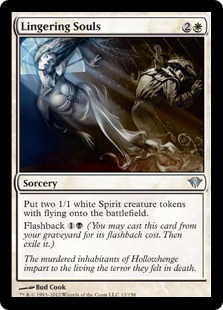 Lingering Souls is literally Delver's worst matchup. It always has been, and I sure hope they never print anything better. Basically, this matchup boils down to whether you can get in early pressure and whether they draw stuff you can interact with easily, or specifically Lingering Souls.
Lingering Souls is literally Delver's worst matchup. It always has been, and I sure hope they never print anything better. Basically, this matchup boils down to whether you can get in early pressure and whether they draw stuff you can interact with easily, or specifically Lingering Souls.
The sideboard Engineered Explosives are for this matchup and Hexproof, though BW Tokens is why you just can't cut them. I was fortunate, and I don't believe my opponent drew a single Souls, which made this match rather easy.
2-0
1-0 overall
Round 2 - Grixis Control
My opponent was on an Ancestral Vision deck, but sometimes they just don't draw them in game one. I believe that Delver versus straight control is closer than many players would think, in particular given the relative strength of Delver's Mana Leaks, which generally keep things like Goblin Dark-Dwellers at bay. My opponent didn't draw any Ancestrals in game one, and then we split the more control-oriented sideboard games.
Pace of play might be the most important element of Grixis mirrors. The games will go long as the majority of both decks are interactive spells. Don't be foolish and try to close quickly, and try to keep up on land drops. Sometimes you are just supposed to fire a Bolt at your opponent's face to keep from discarding. Being overly aggressively will only backfire unless you're under significant Ancestral pressure from your opponent.
2-1
2-0 overall
Round 3 - The Dreaded Tron
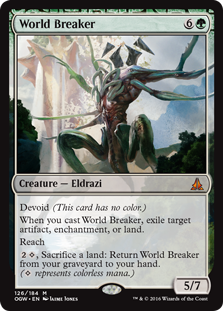 This is why we Delver. Early pressure and hopefully tagging a clutch Sylvan Scrying with Spell Snare is how you win game one. Then in sideboard games you bring in the Spell Pierces to try to cheese Expedition Maps, and Countersqualls to force them to actually get you with one of their creatures.
This is why we Delver. Early pressure and hopefully tagging a clutch Sylvan Scrying with Spell Snare is how you win game one. Then in sideboard games you bring in the Spell Pierces to try to cheese Expedition Maps, and Countersqualls to force them to actually get you with one of their creatures.
Once Tron is online, your window to close is very short with the additions of World Breaker and Ulamog, the Ceaseless Hunger. Even with Delver I believe this matchup is pretty close, though it's better than being significantly unfavored or playing with a heavily skewed control list.
2-1
3-0 overall
Round 4 - RG Valakut
This round I was paired against one of several players on Matthias Hunt's Valakut list. Their most important card is probably Search for Tomorrow, as it's an early ramp spell that doesn't get hit by Spell Snare. Snare does serious work in this matchup assuming their hand is functional. My opponent's draw wasn't particularly strong in a matchup I believe already significantly favors me.
2-0
4-0 overall
Round 5 - Jund
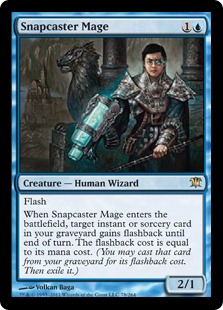 This was a camera match against Jacob Baugh, which can be viewed here. Jund is a great matchup for Snapcaster Mage decks, and while Delver kind of sucks here it's not a significant liability. You won't win many games very quickly, and getting too aggressive is your best route to actually losing. Don't take down countermagic if you don't have to and you should be fine. Post-board things go from bad to worse for the Jund opponent as you get Ancestral Vision to just bury them.
This was a camera match against Jacob Baugh, which can be viewed here. Jund is a great matchup for Snapcaster Mage decks, and while Delver kind of sucks here it's not a significant liability. You won't win many games very quickly, and getting too aggressive is your best route to actually losing. Don't take down countermagic if you don't have to and you should be fine. Post-board things go from bad to worse for the Jund opponent as you get Ancestral Vision to just bury them.
Interestingly, I believe Baugh was supposed to Thoughtseize my Serum Visions rather than my Ancestral, as if I brick on lands he can steal a fast game. It's true that if I naturally peel lands or Thought Scour into them he's in rough shape, but I think the matchup is bad enough that he should have tried to cheese me.
2-0
5-0 overall
Round 6 - Bant Eldrazi
This matchup was against Todd Stevens right before he recorded this deck tech. His deck is sweet, and Cavern of Souls is very good against my deck. I couldn't tell you what the average game looks like, though Todd's hands in games one and three were kind of non-functional, and he expressed that minimally he should have mulliganed his game one hand.
2-1
6-0 overall
Round 7 - Nahiri Shift
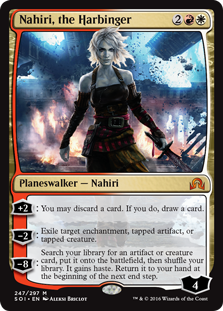 This was a camera match against Eric Rill. The card Scapeshift is very good against Mana Leak, although I believe I'm favored in the matchup given the sideboard Countersqualls. I got a little aggressive in game one when I bricked on my third land drop, and given that the only counter I had access to was Remand, decided I was best served by committing one of my two Delver of Secrets to the battlefield. I was max punished by the one-two punch of Lightning Bolt into Nahiri, though it's debatable whether that game was otherwise winnable. Rill's hands were a little less functional post-board, and as I mentioned my deck gets a lot better when I'm drawing more counters instead of Terminates.
This was a camera match against Eric Rill. The card Scapeshift is very good against Mana Leak, although I believe I'm favored in the matchup given the sideboard Countersqualls. I got a little aggressive in game one when I bricked on my third land drop, and given that the only counter I had access to was Remand, decided I was best served by committing one of my two Delver of Secrets to the battlefield. I was max punished by the one-two punch of Lightning Bolt into Nahiri, though it's debatable whether that game was otherwise winnable. Rill's hands were a little less functional post-board, and as I mentioned my deck gets a lot better when I'm drawing more counters instead of Terminates.
2-1
7-0 overall
Round 8 - The Dreaded Tron
Sometimes you eat the bar, and well, sometimes he eats you. My opponent in this matchup was David Tian, who was the only undefeated player overnight, though he unfortunately stumbled on Day 2. He was a very pleasant opponent, despite the savage Tronning he handed me.
1-2
7-1 overall
Round 9 - The Dreaded Tron
This time I got to eat the bar, with a Spell Snare on Sylvan Scrying in game one completely turning off my opponent's hand. Big fan of Spell Snare.
2-0
8-1 overall
Getting a full night's rest is very important before the second day of an event, and I wish I could say that I got that. Some snoring kept me awake late into the night, and moving to the hotel bathtub to try to catch some sleep was only a moderate improvement. I was not in the same shape for Day 2 that I was for Day 1, though being in second place overnight was a great position.
Round 10 - Eldrazi Taxes
Death and Taxes is Delver's worst matchup in Legacy. In Modern their clunkier Vial curve and a fistful of Terminates from me go a long way in improving the matchup. I stumbled on lands in game two and got got by Leonin Arbiter-Ghost Quarter combo, though no such stumbles occurred in the other games.
2-1
9-1 overall
Round 11 - Infect
This was another camera match, which you can find here. I didn't know Jessup was on Infect, assuming he was on the Jeskai deck the rest of his team was playing. As such, his Gitaxian Probe showed him an embarrassingly bad hand for the matchup on the draw on my side. 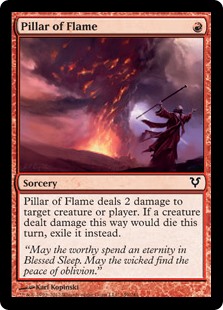 Pillar of Flame demonstrated why you would want a one-mana removal spell in that slot as it showed up right on time, and I managed to steal game one.
Pillar of Flame demonstrated why you would want a one-mana removal spell in that slot as it showed up right on time, and I managed to steal game one.
I am uncertain whether game two was winnable, though I could have played the final turn differently. In general, you'll want to point removal spells at creatures post-combat as much as possible, though the pre-combat Inkmoth Nexus was Jessup's third infect threat, and taking the hit would put me to 8 poison. Had I waited until end step instead of Terminating in combat and dying to Vines of Vastwood I wouldn't have lost that turn. However, it's likely that Jessup just lets his Inkmoth die and then has Vines backup for his lethal swing next turn. I felt pretty about the game as it happened, though the lack of sleep was definitely clogging my thoughts.
I believe this matchup is very close, and play/draw and the Infect player's skill are very significant. All things considered, when I'm at the top of my game I believe I'm favored, though the matchup is definitely loseable.
2-1
10-1 overall
Round 12 - Infect
Once again, one of the games was basically unwinnable. Infect has those hands---that's why you play the deck---though once again I took the match down.
2-1
11-1 overall
Round 13 - Nahiri Jeskai
This match was against Pete Ingram, and was my second loss in the swiss. Electrolyze is exceptional against Delver, and you won't find yourself winning many game ones in this matchup. 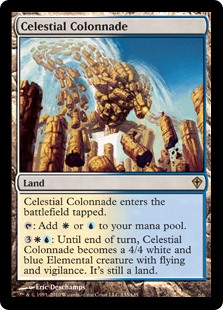 Tragically, the sideboard leaves something to be desired as well, as Nahiri, the Harbinger and Celestial Colonnade demand very different answers. I ended up leaving one Terminate in post-board specifically for Colonnade, and had I drawn it I may have won that game, though multiple copies would have been poor and I ended up coming up short.
Tragically, the sideboard leaves something to be desired as well, as Nahiri, the Harbinger and Celestial Colonnade demand very different answers. I ended up leaving one Terminate in post-board specifically for Colonnade, and had I drawn it I may have won that game, though multiple copies would have been poor and I ended up coming up short.
I've heard rumblings of playing Dreadbore in Grixis for this matchup, and minimally for Delver builds that sounds very loose. In general, being sorcery speed is heavily undesirable, which is compounded in blue mirrors. This is somewhat redundant, but it's also terrible that it doesn't hit Colonnade, and the fact that they can Spell Snare it makes life worse still. I could potentially abide Hero's Downfall, but I advise against Dreadbore.
0-2
11-2 overall
Round 14 - Elves
Elves is a solidly favorable matchup. You're great at killing their relevant creatures, and Delver gives you a fast clock that they generally can't interact with. Cavern of Souls, Lead the Stampede, and Collected Company can be problematic, though just in terms of average card quality and strategy Delver is advantaged.
2-1
12-2 overall
Round 15 - Kiki Chord
With only two losses and great breakers, I was locked for Top 8 even with a loss in this round. Seeding definitely matters for Delver though, and while I would have been fine with a draw my opponent was unable to draw in. Birthing Pod was a very close matchup for Delver, though I believe that the combo creature decks that currently exist are all comfortably favorable for Delver. Pod only needed to resolve once, but if one Chord of Calling resolves you're usually still playing Magic.
2-1
13-2 overall
A win here put me in second place going into the Top 8, and I felt happy knowing I'd have the play in the quarterfinals. I didn't really pay any attention to what else made Top 8, and spent my time beforehand decompressing. 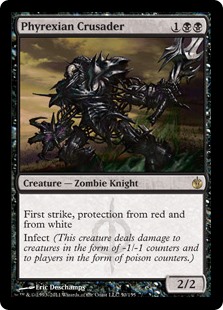 When I found out that Phyrexian Crusader was waiting for me in the quarterfinals, I wasn't exactly thrilled.
When I found out that Phyrexian Crusader was waiting for me in the quarterfinals, I wasn't exactly thrilled.
Quarterfinals - GB Infect
As you might expect, I have considerably more experience against the blue build of this deck than the black, though no amount of preparation removes protection from red from Phyrexian Crusader. I won game one, and the sideboard Go for the Throat helps, though having to leave in Remand just because you need as many ways to answer Crusader as possible is very unfortunate against such a lean deck---especially one flush with discard spells.
In game two I found myself in one of those no-win scenarios on the draw, and in game three the game was largely decided by the fact that I stumbled on mana. My spells didn't line up exceptionally against Zurawski's, though ultimately I believe game three may have been winnable had I hit my third land on time. I had some options for how I played the game given my draw, though i don't believe any of them would lead to victory. So it goes.
Conclusion
All in all, I have no intention of putting Grixis Delver down anytime soon. I believe the deck has game against everything in Modern, and is even favored in the majority of matchups---no small feat in such a diverse format. Just don't get cute and try to play Young Pyromancers or Vapor Snags. The only changes I'm currently considering are what, if anything, to do with the Pillar of Flame slot and whether the Ancestral Visions can be removed from the sideboard for something more elegant with broader applications.
If you're interested in trying the deck out, the most important thing to remember is patience. Just because your deck has a one-mana creature doesn't mean you have to win quickly. Play tightly, and you'll find yourself winning plenty of long games. One-land Delver hands are not keepable, though one-land Serum Visions hands digging for lands are often excellent.
Finally, a note about contacting me. I strongly prefer to use Facebook for my personal life, so I would appreciate if you directed any questions through other channels. I'm very good about responding on Twitter, and I've fielded a lot of questions about the deck on that medium. I'm flattered by all the attention---honestly---but I'd much rather just answer questions one time publicly than dozens of times privately.
That said, if you do have any questions, let me know on Twitter or comment below.
Thanks for reading,
Ryan Overturf
@RyanOverdrive on Twitter




Hey Ryan,
Congratulations on the result, and thanks for taking the time to write this up. Your list has opened my eyes to a few things (namely ditching the Pyromancers, Pillar of Flame as a flex card, and ticking Spell Snare up to 4 copies), but I am somewhat curious regarding the 3/1 split between Tasigur, the Golden Fang and Gurmag Angler. I would have thought that the legendary rule combined with the slightly smaller body disincentivized the 3rd Tasigur pretty heavily. Is this because you want a good chance to hit a Tasigur every game? I’d appreciate some thoughts on this.
I’m also a tad curious regarding what the contributions made by Spell Pierce are in a sideboard that already features Dispel and Countersquall (which are both excellent). Wouldn’t another type of catch-all such as Thoughtseize give you a bit more juice? I could be wrong on this, but that’s my initial impression.
Thanks for any and all answers,
Roland
Tasigur’s ability is actually quite good, though the primary concern is that with a fetch and a Thought Scour you will be able to Tasigur on turn two, whereas Gurmangler takes a little more work. If Tasigur weren’t legendary, it might very well be a 4 Tasigur 0 Angler.
The flexibility and efficiency of Spell Pierce make it a great option in several matchups. It comes in against Tron, Hexproof, and Burn in addition to a number of other matchups. Having a Pierce up on turn one to catch an Expedition Map or something like Chalice of the Void from a wonky Tezzeret deck comes in handy. It’s among the least powerful sideboard cards, but also the most flexible. I like it better than discard because it’s tempo positive and this deck is pretty light on lands for sorcery speed action.
Thanks for this article.
Quick question on the Jund match-up – do you believe it’s right to take out the Delvers as they’re just Lightning Bolt fodder?
As long as Ancestral is in the sideboard, it’s an upgrade to Delver in that matchup, though Delver isn’t actually actively bad. It will often trade one for one, but the game one matchup is still positive even with the Delvers in.
Hi Ryan, congratulations on the finish with such a fun deck!.
There´s one thing clicking on my head. “Just don’t get cute and try to play Young Pyromancers or Vapor Snags.”
I have to tell you that i´ve been playing LSV UR Delver prior to PT Eldrazi, and it´s been fantastic.
Young Pyromancer DOES win games, just like it does in Legacy.
Vapor Snag helps too, when yoy have to race or die.
Maybe Grixis version a little bit more controlish?.
I want to know why you prefer to go with a control route instead of a more Tempo-Aggro route.
Thanks.
There are too many decks that are too good at killing Young Pryomancer. Tasigur is so much more resilient, and ties up less mana at Sorcery speed on average. Vapor Snag is good in specific situations, though my list is built to have the best chance in the most possible situations. The Vapor Snag builds are built to maximize the ability to race, whereas my build is constructed to maximized the ability to play Magic.
Ok, that was a little hard but you are probably right.
Some other questions regarding MB and SB.
How did 4 Spell snares felt? I know its good, but i´ve never played that many in a Modern deck.
How good (or bad) is your match against Affinity and Naya Burn?.
Thanks!.
I’m not sure what you mean when you say my response was hard…
Anyway… Four Snares is great. The number of decks where the card is only okay is incredibly small, though there is the random Living End matchup where it’s just dead. When it’s good, you want four- particularly in Snapcaster mirrors. It’s so mana efficient, and the format is largely defined by two mana spells.
Affinity is a tremendously positive matchup. This is one matchup where the four Spell Snares really shine. Outside of Etched Champion, Snare counters basically all of their good cards. You have a ton of interaction, and area also able to clock them, which makes their life difficult.
Burn is a pretty close matchup. You have all the right tools, though they have to line up at the right times. If you have a Bolt for Goblin Guide and a Snare for Eidolon you’ll often be golden, though you won’t have much time to draw out of precarious situations. Many of your wins will be on one life and will require very good play, though with a high level of play you should win the majority of your matches against Burn.
My comment on hard was directed at “That one is good at racing, mine is good at Magic”, but not in a bad way, it was harsh truth. I can handle the truth.
Yeah, Spell Snare wrecks Affinity hard. It is indeed an excellent Magic card for Modern.
Your build looks very stacked and redundant, which seems optimal in a format like Modern where decks that shine seem to have that particularity, Redundancy.
I´m pretty sure i will give this list a ride at the nationals of my country.
I hope other graveyard strategies don´t catch up, because this decks seems to match up poorly against GY hate like Graff´s Cage, Leyline and Rest in Peace.
The deck is actually not expressly bad against graveyard hate. Depending on how functional their hand is otherwise, sometimes you both end up being down the same number of cards when they play graveyard hate. Like, if they lead on Leyline and you draw one Delve creature then it’s only a one for one, and if they draw redundant hate it just doesn’t do anything. Unless they kill quickly you can still eventually cast the delve creatures, and Snapcaster Mage while a bad card is still a card against graveyard hate.
I will say, that this deck is likely very bad against decks like Dredge though. If they get ahead early they probably win. Should Dredge become a popular choice, it will minimally warrant some sideboard changes.
Oh, well, that´s good news then.
Thanks very much for the insight Ryan!.
Hey Ryan, congratulations on your great run!
Just wondering about your land count. Most Delver decks I’ve seen run 18, or even 17 lands, and rarely 19. Especially considering your choice to only run 1 Kolaghan’s Command as a late-game value engine with Snapcaster, doesn’t 20 lands seem quite high?
That seems to be the popular consensus, but honestly there are matchups (blue mirrors) where I want to board in an extra land or two. This deck hinges quite hard on Mana Leak/two mana counters, and in order to hold them up while you cast a threat you need at least three mana. To Snapcast them, you need four. Most of the games you lose with this list actually involve stumbling on mana- not getting flooded.
Thanks, that makes a lot of sense. I think I’ll try your list with a different sideboard and one Darkslick Shores over an extra Watery Grave, since I play against a lot of Burn and 2 points of damage can make the difference in that match.
Ryan would it be possible for you to give more information on how did you sideboard on each match and why? I know this is a bit late so maybe next tournament report.
Thanks a lot for such a helpful article btw, this is not your normal delver deck.